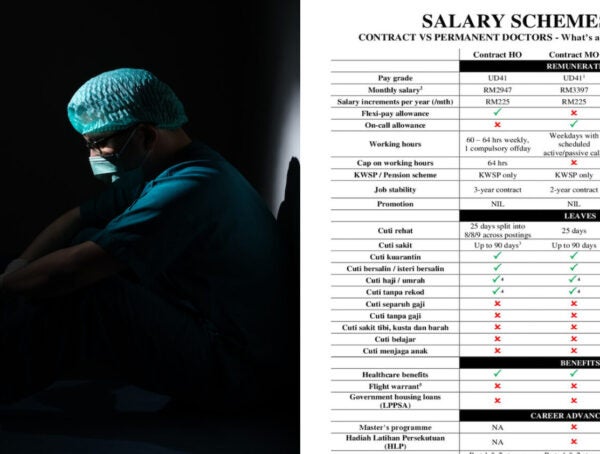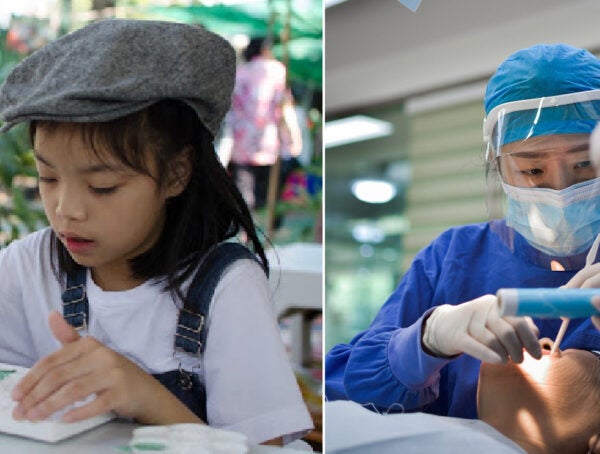Xian and J are two doctors working at the frontlines. Serene is a farmer who delivers fresh veggies to families in Subang Jaya.
And Franko is a grab driver who has had his livelihood affected by the movement restriction order.
Here are some short stories from these essential workers and healthcare frontliners:
1. “We closed down a whole ward and disinfected it.”
![3 Short Stories From Malaysia’s Essential Workers And Frontliners in In Real Life [Thermal Screening Conducted During Roadblocks By Jabatan Imigrasi Malaysia. Image Via Jabatan Imigresen Johor Fb Page.]](https://inreallife.my/wp-content/uploads/2020/05/Jabatan-Imigrasi-Malaysia-4.jpg) [Thermal screening conducted during roadblocks by Jabatan Imigrasi Malaysia. Image via Jabatan Imigresen Johor FB page.]
[Thermal screening conducted during roadblocks by Jabatan Imigrasi Malaysia. Image via Jabatan Imigresen Johor FB page.]
Xian is a doctor who works as part of the SWAT c*v*d team in a hospital in Shah Alam. He’s in charge of screening patients who have close contact with friends/family who are tested positive.
“In recent weeks, the number of positive patients has gone down, and we’ve had to do fewer screenings,” says Xian.
Yet sometimes, his work is complicated by patients who aren’t completely truthful about their movement history.
“One time a patient hid his travel history from the health staff. When we did our routine checks, one of our staff was tested positive. So the whole department had to be tested and quarantined before we were able to return to work,” said Xian.
![3 Short Stories From Malaysia’s Essential Workers And Frontliners in In Real Life [The Spanish Flu, Named After The Country That Was Hit The Worst By It. Image Via History.]](https://inreallife.my/wp-content/uploads/2020/05/Spanish-Flu-Pandemic.jpg) [The Spanish Flu, named after the country that was hit the worst by it. Image via History.]
[The Spanish Flu, named after the country that was hit the worst by it. Image via History.]
J, another doctor, believes that so far things are under control, but if the government relaxes the MCO rules, a second wave of infections are very likely to occur.
“If they lift the MCO and let people go back to their kampungs for Raya, they will spread it to the kampungs,” said J.
“The doctors in the area will be overwhelmed, contract it themselves (as has already happened before), and then the tertiary hospitals will be flooded again,” J predicted.
In 1918, the majority of infections from the Spanish flu pandemic came from their second wave when they lifted the restriction order too early. This resulted in an estimated 30% of the world’s population being infected by the virus.
What will you do if that happens?
“We just have to handle it lor what to do. Who else will do it if not us?” He said pragmatically.
Meanwhile, Xian maintains a positive outlook throughout the crisis.
“I just hope that people will take it seriously, stay home and don’t travel about, so we can keep it under control,” he emphasized.
2. “I take so many more food delivery orders now.”
![3 Short Stories From Malaysia’s Essential Workers And Frontliners in In Real Life [Franko Tan — Full-Time Grab Driver. Reposted With His Permission.]](https://inreallife.my/wp-content/uploads/2020/05/WhatsApp-Image-2020-05-01-at-00.31.23.jpeg)
[franko tan — full-time grab driver. Reposted with his permission. ]
I asked Franko how his income has been impacted.
“I used to earn RM180-200. Now I get RM100 on a good day. Some days I get RM60-70 but as long as I cover my expenses, car rental, petrol, and some extra for food, that’s enough for me,” he said.
While the sheer volume of passengers has been drastically lowered, he says he can still survive by taking on food deliveries.
“A lot of food deliveries now. One time I even picked up a spare part from Cheras to Damansara,” he added.
Since the Movement Order Restriction has been in effect, the number of Grab express food orders has skyrocketed.
“Cook at home also sien after a week, so now everyone just order in lor,” he chuckled.
Franko says he’ll do everything except delivering food when it’s raining heavily. I asked him if it’s because getting out of the car invites risk to his safety.
“No, I just don’t like getting wet,” he said.
3. “When the MCO hit, we lost all our flowers.”
![3 Short Stories From Malaysia’s Essential Workers And Frontliners in In Real Life [Serene’s Family Owns A Flower Farm In Cameron Highlands.]](https://inreallife.my/wp-content/uploads/2020/05/WhatsApp-Image-2020-04-20-at-21.01.58-Copy-Copy.jpeg)
[serene’s family owns a flower farm in cameron highlands. ]
Serene Sin Yee and her family are a small flower-growing business in Cameron Highlands.
Most of their flowers were under a contract to be exported overseas. When the MCO hit, their main source of income was impacted.
“A lot of our flowers died,” Serene said, “So we had to think fast. We thought about how we could supply the local market, and diversified to vegetables.”
Without wasting any time, they began converting the flower land to plant vegetables to sustain their income.
To spread the word, Serene posted her family’s new services to FB groups. For their first order, they collected 30 orders in the first week.
They sent their first batch vegetables from Cameron Highlands with a 5-ton lorry and distributed them with the help of logistic services such as Grab Express and Lalamove.
![3 Short Stories From Malaysia’s Essential Workers And Frontliners in In Real Life [Serene’s Parents And Brother Pack The Bundles Of Veggies Into Cardboard Boxes To Be Delivered To Families In Kl]](https://inreallife.my/wp-content/uploads/2020/05/WhatsApp-Image-2020-04-21-at-15.09.06-Copy.jpeg)
[serene’s parents and brother pack the bundles of veggies into cardboard boxes to be delivered to families in kl. ]
“All this while, we were doing B2B (Business to Business) — now that we pivoted to B2C (Business to Customers), we spend a lot more time on operations and communications,” she mused.
Yet Serene is optimistic. She believes all these issues can potentially be improved as they move forward.
“I also love collecting instant feedback from customers directly — fulfilling their requests becomes a more personal experience,” she says.
There is a silver lining in the clouds
Amidst the struggles and trials of the people who have been affected by the crisis, this unique time in history offers important lessons for the rest of us to take home.
For example, many things which we thought were essential — like cafes, shopping malls, cinemas, and offices — are actually not that essential at all.
“Indeed, this period is a tough time for everyone, but then again, it also teaches us not to forget that human needs are only food, accomodation, transportation, clothes and healthcare,” Serene reflected.
What are your thoughts about this? Let us know in the comments!

You might also like
More from Real People
‘A RM100 fee cost a company 5 years of revenue’ shares M’sian
This story is about a Malaysian who learned that bureaucracy can be defeated simply by not arguing with it.A billing …
‘I quiet-quit, upskilled, and tripled my salary,’ shares M’sian engineer
This story is about a Malaysian who learned that loyalty without leverage leads nowhere in the corporate world.After years of …
‘I did everything right, and it still wasn’t enough’ shares M’sian graduate
This story is about a Malaysian graduate navigating big dreams in a job market where a degree no longer guarantees …

















